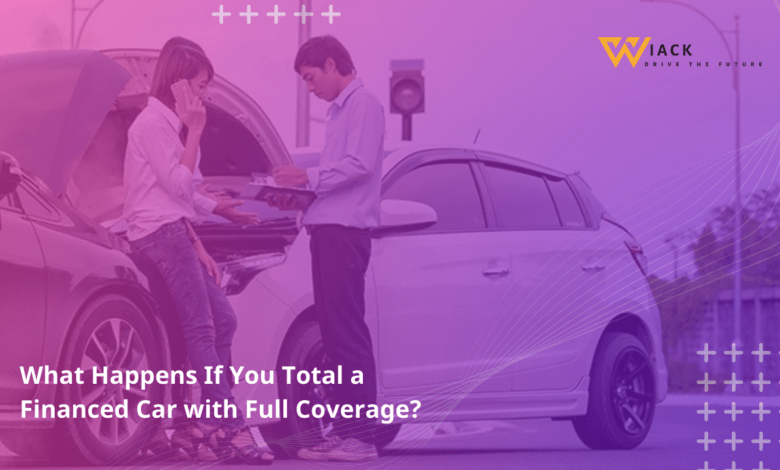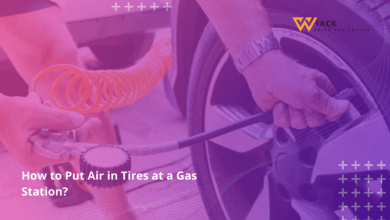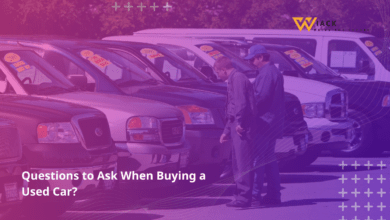What Happens If You Total a Financed Car with Full Coverage?

Did you know that approximately 6% of insured drivers file a claim each year, and about 3% of those claims involve a total loss? This statistic highlights the importance of understanding what happens when you total a financed car with full coverage. Whether you’re a new car owner or have been driving for years, knowing how to navigate this situation can save you from financial stress and help you make informed decisions.
Understanding the Situation
When you find yourself in a situation where you’ve totaled a financed car with full coverage, it’s crucial to understand the key components at play. Let’s break down the essential elements to give you a clear picture of what you’re dealing with.
Totaled Car: Definition and Impact
A car is considered “totaled” when the cost of repairs exceeds a certain percentage of the vehicle’s value. This threshold varies by state and insurance company, but it typically ranges from 70% to 100% of the car’s actual cash value (ACV). For example, if your car is worth $10,000 and the repair costs are estimated at $8,000, it would likely be declared a total loss.
The impact of having a totaled car goes beyond just losing your vehicle. It can affect your daily routine, work commute, and financial obligations. Understanding this concept is crucial because it determines how your insurance company will handle your claim and what compensation you can expect.
Key points to remember about totaled cars:
- The definition varies by state and insurer
- It’s based on the cost of repairs versus the car’s value
- A totaled car doesn’t always mean it’s completely destroyed
Full Coverage: What It Covers
Full coverage is a term that often misleads car owners. It’s not actually a specific type of insurance but rather a combination of different coverages. Typically, full coverage includes:
- Liability coverage: This protects you if you’re at fault in an accident and cause damage to others.
- Collision coverage: This pays for damage to your car from a collision with another vehicle or object.
- Comprehensive coverage: This covers non-collision-related damage, such as theft, vandalism, or natural disasters.
It’s important to note that even with full coverage, you may still have out-of-pocket expenses in the event of a total loss. Your policy will have limits and deductibles that affect how much you’ll receive in a claim.
Financed Car: Loan Agreement and Implications
When you finance a car, you’re essentially borrowing money to purchase the vehicle. This means you don’t fully own the car until you’ve paid off the loan. The loan agreement has several implications when it comes to totaling a financed car:
- The lender has a financial interest in the vehicle
- You’re obligated to continue making payments even if the car is totaled
- The insurance payout may not cover the entire loan balance
Understanding these implications is crucial because they affect how the insurance claim process will unfold and what financial responsibilities you may still have after the car is totaled.
Insurance Company’s Role
When you total a financed car with full coverage, your insurance company plays a pivotal role in determining the outcome of your situation. Let’s explore the key aspects of their involvement and how it affects you.
Actual Cash Value (ACV) Determination
The Actual Cash Value (ACV) is the cornerstone of how insurance companies handle total loss claims. It’s essentially what your car was worth immediately before the accident, taking into account factors like:
- Age of the vehicle
- Mileage
- Overall condition
- Market value of similar cars in your area
Insurance companies use various methods to calculate ACV, including:
- Comparable vehicle analysis
- Valuation tools like Kelley Blue Book
- Third-party appraisals
It’s important to understand that the ACV may be significantly less than what you paid for the car or what you still owe on your loan. This discrepancy can lead to financial challenges, which we’ll discuss later.
Deductible Deduction
Your insurance policy’s deductible plays a crucial role in the payout process. The deductible is the amount you agree to pay out of pocket before your insurance coverage kicks in. In the case of a total loss, this amount is typically subtracted from the ACV payout.
For example:
- Your car’s ACV: $15,000
- Your deductible: $500
- Insurance payout: $14,500
Understanding your deductible and its impact on the payout is essential for managing your expectations and planning your finances after a total loss.
Initial Payment to Loan Provider
When you have a financed car, the insurance company typically sends the payout directly to the lender first. This is because the lender has a financial interest in the vehicle until the loan is paid off.
The process usually follows these steps:
- Insurance company determines the ACV
- Deductible is subtracted from the ACV
- Remaining amount is sent to the lender
- Any excess (if the payout exceeds the loan balance) is then sent to you
This process ensures that the lender’s interest is protected, but it can sometimes leave you in a challenging financial position, especially if the payout doesn’t cover the entire loan balance.
Potential Shortfall
One of the most significant challenges you may face when you total a financed car with full coverage is the potential shortfall between the insurance payout and your remaining loan balance. This situation can leave you owing money on a car you no longer have.
Loan Balance Exceeding ACV
It’s not uncommon for your loan balance to exceed the Actual Cash Value (ACV) of your car, especially in the early years of your loan. This situation is often referred to as being “upside down” or having “negative equity” in your vehicle.
Several factors contribute to this:
- Rapid depreciation: New cars can lose up to 20% of their value in the first year.
- Long-term loans: Extending your loan term (e.g., 72 or 84 months) can lead to owing more than the car is worth for a longer period.
- Low down payment: A small down payment means you start with less equity in the vehicle.
- High-interest rates: More of your early payments go towards interest rather than principal.
For example, let’s say you financed a $25,000 car. Two years later, you total the vehicle. The insurance company determines the ACV is $18,000, but you still owe $22,000 on your loan. This leaves you with a $4,000 shortfall that you’re responsible for paying.
Gap Coverage or Loan/Lease Payoff Coverage
To protect against the potential shortfall, many car owners opt for additional coverage known as Gap insurance or Loan/Lease Payoff coverage.
Gap Insurance:
- Covers the “gap” between the ACV and your loan balance
- Usually available as an add-on to your auto insurance policy
- Can also be purchased through your lender or as a standalone policy
Loan/Lease Payoff Coverage:
- Similar to Gap insurance but typically has a limit (e.g., 25% of the car’s ACV)
- Often less expensive than Gap insurance
- May be included in some “full coverage” policies
These coverages can provide significant financial protection if you total a financed car. Without them, you could be left owing thousands of dollars on a car you can no longer drive.
It’s important to note that these coverages have limitations and exclusions. For example, they typically don’t cover:
- Carry-over balances from previous loans
- Extended warranties or other add-ons financed with the car
- Late fees or missed payments
Understanding these coverages and whether you have them is crucial when dealing with a total loss of a financed vehicle.
Steps After Totaling a Financed Car
If you find yourself in the unfortunate situation of having totaled a financed car with full coverage, it’s essential to take prompt and appropriate action. Following these steps can help you navigate the process more smoothly and potentially minimize financial stress.
Contacting Insurance Provider
The first and most crucial step after totaling your financed car is to contact your insurance provider immediately. Quick action can help expedite the claims process and ensure you don’t miss any important deadlines.
When you contact your insurer:
- Provide accurate information: Give a detailed account of the accident or incident that led to the total loss.
- Ask about the claims process: Understand what documents you need to submit and any deadlines you need to meet.
- Inquire about a rental car: If your policy includes rental car coverage, ask how to access this benefit.
- Discuss your coverage: Confirm what type of coverage you have, including any Gap insurance or Loan/Lease Payoff coverage.
- Get a timeline: Ask for an estimated timeline for the claims process and when you can expect a resolution.
Remember to take notes during this conversation and get the name of the representative you spoke with. This information can be valuable if you need to follow up or if there are any discrepancies later in the process.
Filing a Claim
Filing a claim is a critical step in the process of dealing with a totaled financed car. Here’s a general outline of what you can expect:
- Provide necessary information: This typically includes:
- Your policy number
- Date and location of the incident
- A description of what happened
- Information about other parties involved (if applicable)
- Submit required documents: You may need to provide:
- Police report (if one was filed)
- Photos of the damage
- Medical reports (if there were injuries)
- Vehicle inspection: The insurance company will likely want to inspect the vehicle to assess the damage.
- ACV determination: The insurer will calculate the Actual Cash Value of your vehicle.
- Review the offer: Once the insurance company determines the ACV, they’ll make an offer. Review this carefully and don’t be afraid to negotiate if you believe the value is too low.
- Accept the offer: If you agree with the valuation, you’ll need to formally accept the offer.
Throughout this process, stay in regular communication with your claims adjuster and don’t hesitate to ask questions if anything is unclear.
Negotiating with Loan Provider
After the insurance claim is settled, you may need to negotiate with your loan provider, especially if there’s a shortfall between the insurance payout and your loan balance.
Here are some strategies for negotiating with your lender:
- Explain the situation: Provide details about the total loss and the insurance payout.
- Ask about options: Some lenders may offer:
- Payment plans for any remaining balance
- The option to roll the remaining balance into a new car loan
- Loan forgiveness (in rare cases)
- Request a payoff amount: Get an exact figure for what you owe after the insurance payout is applied.
- Discuss hardship programs: If you’re facing financial difficulties, ask if the lender has any hardship programs that could help.
- Consider seeking legal advice: If you’re facing a significant shortfall and can’t reach an agreement with your lender, it may be worth consulting with a consumer protection attorney.
Remember, lenders are often willing to work with borrowers to find a solution, as it’s in their interest to recoup as much of the loan as possible.
Preventing Financial Burden
While dealing with a totaled financed car can be stressful, there are steps you can take to prevent or minimize the financial burden in such situations. Understanding and implementing these preventive measures can provide peace of mind and financial protection.
Importance of Gap Coverage
Gap coverage is a crucial tool in protecting yourself from potential financial hardship when you total a financed car with full coverage. Here’s why it’s so important:
- Bridges the gap: Gap insurance covers the difference between what you owe on your car loan and the car’s actual cash value (ACV) at the time of the total loss.
- Protects against depreciation: Cars depreciate quickly, especially in the first few years. Gap coverage protects you from owing money on a car that’s worth less than your loan balance.
- Provides peace of mind: Knowing you won’t be stuck with a large bill if your car is totaled can reduce stress and financial worry.
- Relatively inexpensive: Compared to the potential thousands you might owe without it, gap insurance is often quite affordable.
- Especially valuable for certain situations: Gap coverage is particularly important if you:
- Made a small down payment
- Have a long-term auto loan (60 months or more)
- Lease your vehicle
- Bought a car that depreciates quickly
When considering gap coverage, be sure to shop around. You can often get it from your auto insurer, but it’s also available from some car dealerships and standalone providers.
Understanding Loan/Lease Payoff Coverage
Loan/Lease Payoff coverage is similar to gap insurance but works slightly differently. Here’s what you need to know:
- Coverage limit: Unlike gap insurance, which covers the entire difference between your loan balance and ACV, Loan/Lease Payoff coverage typically has a limit, often 25% of the car’s ACV.
- Part of full coverage: This coverage is sometimes included in “full coverage” auto insurance policies, so check your policy details.
- Potentially lower cost: It may be less expensive than standalone gap insurance.
- Flexibility: You can usually add this coverage at any time, not just when you purchase the vehicle.
- Limitations: Like gap insurance, it doesn’t cover things like extended warranties or credit life insurance included in your loan.
Understanding the differences between gap insurance and Loan/Lease Payoff coverage can help you choose the best option for your situation.
Review Insurance Policy Regularly
Regularly reviewing your insurance policy is a crucial step in preventing financial burden when you total a financed car with full coverage. Here’s why and how to do it effectively:
- Annual review: Set a reminder to review your policy at least once a year or whenever your circumstances change.
- Check coverage limits: Ensure your coverage limits are adequate for your current situation.
- Update vehicle value: As your car depreciates, you may be able to adjust your coverage and potentially save on premiums.
- Reassess deductibles: Consider if your current deductibles still make sense for your financial situation.
- Look for new discounts: Ask your insurer about any new discounts you might qualify for.
- Compare with other providers: Get quotes from other insurance companies to ensure you’re still getting the best deal.
- Understand policy changes: If your insurer makes any changes to your policy, make sure you understand how they affect your coverage.
By staying on top of your insurance policy, you can ensure you have the right coverage at the right price, potentially saving you from financial hardship if you ever total your financed car.
Additional Considerations
When you total a financed car with full coverage, there are several additional factors to consider beyond the immediate insurance claim and loan payoff. These considerations can have long-term impacts on your financial health and future car ownership.
Impact on Credit Score
Totaling a financed car can potentially affect your credit score, depending on how you handle the situation. Here’s what you need to know:
- Loan payoff: If the insurance payout covers your entire loan balance, and you pay off the loan promptly, there should be no negative impact on your credit score.
- Remaining balance: If there’s a remaining balance after the insurance payout, how you handle it can affect your credit:
- Paying it off quickly: This can actually improve your credit score by reducing your overall debt.
- Setting up a payment plan: If you make payments on time, this shouldn’t negatively impact your score.
- Defaulting on the remaining balance: This can severely damage your credit score.
- Credit utilization: Paying off your auto loan can temporarily lower your credit score by changing your credit utilization ratio.
- Length of credit history: If the auto loan was one of your oldest credit accounts, closing it might slightly lower your score.
- New loan for replacement vehicle: If you take out a new loan for a replacement vehicle, this will result in a hard inquiry on your credit report and could temporarily lower your score.
To minimize negative impacts:
- Stay in communication with your lender
- Make all payments on time
- Consider setting up automatic payments for any remaining balance
Replacing the Vehicle
After totaling your financed car, you’ll likely need to consider how to replace it. Here are some factors to keep in mind:
- Assess your needs:
- Has your situation changed since you bought the totaled car?
- Do you need a similar vehicle, or could you downsize?
- Budget considerations:
- How much can you afford for a down payment?
- What monthly payment fits your budget?
- Factor in potential changes in insurance costs
- Financing options:
- Traditional auto loan
- Lease
- Cash purchase (if possible)
- Timing:
- You may need to act quickly if you rely on a vehicle for daily transportation
- However, don’t rush into a decision you might regret later
- New vs. Used:
- Consider the pros and cons of buying a new car versus a used one
- New cars offer the latest features and full warranty coverage but depreciate quickly
- Used cars can offer better value but may have higher maintenance costs
- Insurance considerations:
- How will your insurance premiums change with a different vehicle?
- Will you need gap insurance or loan/lease payoff coverage for the new vehicle?
- Learn from the experience:
- Consider factors that may have contributed to totaling your previous car (e.g., safety features, vehicle size) when choosing a replacement
Remember, taking the time to carefully consider your options can help you make a better decision in the long run, even if you’re feeling pressure to replace your vehicle quickly.
Future Insurance Costs
Totaling a car can have implications for your future insurance costs, even if you weren’t at fault. Here’s what you should be aware of:
- Rate increases:
- If you were at fault for the accident that totaled your car, you may see a significant increase in your insurance rates
- Even if you weren’t at fault, some insurers may still raise your rates, though the increase is typically smaller
- Loss of discounts:
- You may lose safe driver discounts or claim-free discounts after totaling a car
- High-risk classification:
- Multiple accidents or claims within a short period could lead to being classified as a high-risk driver, resulting in higher premiums
- Impact duration:
- Accidents typically affect your insurance rates for 3-5 years, depending on your insurer and state regulations
- Shopping around:
- Different insurers treat total loss claims differently, so it may be worth getting quotes from multiple companies when insuring your replacement vehicle
- Mitigating factors:
- Taking a defensive driving course
- Maintaining a clean driving record after the incident
- Choosing a vehicle with advanced safety features
- Policy review:
- Review your new policy carefully, as your coverage needs may have changed
Understanding these potential impacts can help you budget for future insurance costs and make informed decisions about your replacement vehicle and insurance coverage.
Conclusion
Dealing with a totaled financed car can be a complex and stressful situation, but understanding the process and your options can help you navigate it more effectively.
Summary of Key Points
Let’s recap the most important points to remember when you total a financed car with full coverage:
- Understanding the situation:
- Know what “totaled” means and how it’s determined
- Understand what your full coverage actually covers
- Recognize the implications of having a financed car
- Insurance company’s role:
- They determine the Actual Cash Value (ACV) of your car
- Your deductible is subtracted from the payout
- The initial payment typically goes to your lender
- Potential shortfall:
- Your loan balance may exceed the ACV
- Gap coverage or Loan/Lease Payoff coverage can protect you from this shortfall
- Steps to take:
- Contact your insurance provider immediately
- File a claim promptly and accurately
- Negotiate with your loan provider if necessary
- Preventing financial burden:
- Consider gap coverage or loan/lease payoff coverage
- Review your insurance policy regularly
- Additional considerations:
- Be aware of potential impacts on your credit score
- Plan carefully when replacing your vehicle
- Understand how this may affect your future insurance costs
Seeking Professional Advice
While this guide provides a comprehensive overview, every situation is unique. Consider seeking professional advice from:
- Insurance agent: They can explain your coverage in detail and help you understand your options
- Financial advisor: They can help you navigate the financial implications and plan for replacing your vehicle
- Consumer protection attorney: If you’re facing a significant shortfall or disputes with your insurer or lender
- Credit counselor: If you’re concerned about the impact on your credit or need help managing any remaining debt
Professional advice can provide personalized guidance tailored to your specific circumstances.
Resources for Further Information
To further educate yourself on this topic, consider exploring these resources:
- Insurance Information Institute (III): Offers comprehensive information on auto insurance topics
- National Association of Insurance Commissioners (NAIC): Provides consumer guides and resources related to insurance
- Consumer Financial Protection Bureau (CFPB): Offers information on auto loans and financial protection
- Your state’s Department of Insurance: Can provide state-specific information on insurance regulations and consumer rights
- Kelley Blue Book or NADA Guides: Useful for understanding vehicle values
Remember, being well-informed is your best defense against financial hardship when dealing with a totaled financed car. Take the time to understand your policy, know your rights, and don’t hesitate to ask questions or seek help when needed.
By following the guidance in this article and utilizing available resources, you can navigate the challenging situation of totaling a financed car with full coverage more confidently and minimize potential financial setbacks. Stay proactive, informed, and prepared to ensure the best possible outcome in this unfortunate circumstance.
Get the latest car news, reviews, and prices at Wiack.com. Your one-stop destination for all things automotive.





